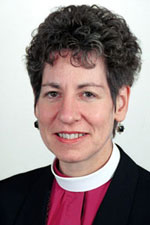Biography

Katharine Jefferts was born in Pensacola, Florida in 1954. The daughter of two scientifically minded parents - her father earned a Ph.D. in Physics and her mother a doctorate in Biology - Jefferts was also raised in the church, beginning with primary schooling at a convent school run by French nuns. Jefferts grew up in Seattle, Washington and in New Jersey, where she graduated from high school. From there she attended Stanford University, where she studied marine biology, swam competitively and played water polo, and learned to scuba dive and fly airplanes - both skills that she used as part of her research.
In 1974, at the age of twenty, Jefferts began her graduate training in Oceanography at Oregon State University. As a master's candidate, she studied near shore infauna. Later, while working on her OSU Ph.D., she turned her focus to systematics and taxonomy in cephalopods.
From an early age, Jefferts had wrestled with her sometimes conflicting interests in science and religion; a class on research methods that she took at OSU helped to clarify her thinking in this regard. While in Corvallis, Jefferts also became involved with the city's Good Samaritan Episcopal Church and it is here that she met the man who would become her husband, Richard Schori, then chair of the OSU Mathematics Department.
Jefferts Schori completed her Ph.D. in 1983, in the process becoming the first female to earn a doctorate from Oregon State's Oceanography program. After one year away working on a grant-funded position for the National Marine Fisheries Service, Jefferts Schori returned to Corvallis, facing a bleak job market.
It was during this time that members of the Good Samaritan congregation asked if she had ever considered entering the priesthood. Jefferts Schori, who had been taking classes from the OSU Religious Studies program and had been leading adult education activities as a lay member of her church, considered this idea for five years before finally beginning divinity studies at Mt. Angel Abbey, some fifty-five miles north of Corvallis. After one year at Mt. Angel, she transferred to the Church Divinity School of the Pacific in Berkeley, California, where she completed her schooling.
Jefferts Schori returned to Corvallis in 1994 and spent more than five years as a member of the town's religious community. During this time she worked as a hospice chaplain, led the area's congregation of Latino Episcopalians, and taught courses in Religious Studies and Philosophy at the university.
In October 2000, Jefferts Schori entered into a more prominent leadership role within the Episcopal Church when she was elected Bishop for the diocese of Nevada. Charged with reinforcing the well-being of the congregations in the diocese, Jefferts Schori commonly piloted her own plane as she visited churches around the state. During this time period, she also developed a reputation as leader who encouraged change within an increasingly multicultural religious community.
In 2006 Jefferts Schori was elected to a nine-year term as Presiding Bishop and Primate of the Episcopal Church, the chief ecumenical officer of the church's global operation. Jefferts Schori was both the first woman and the first individual from the western United States to occupy this role. As leader of the church, Jefferts Schori's responsibilities have included travel to all 110 Episcopalian dioceses, including those in Asia, Latin America and the Caribbean, to learn about and respond to their needs. In her travels and her actions, Jefferts Schori has continued to emphasize the importance of inclusivity within the church, particularly as concerns ethnicity, gender and sexual orientation.

